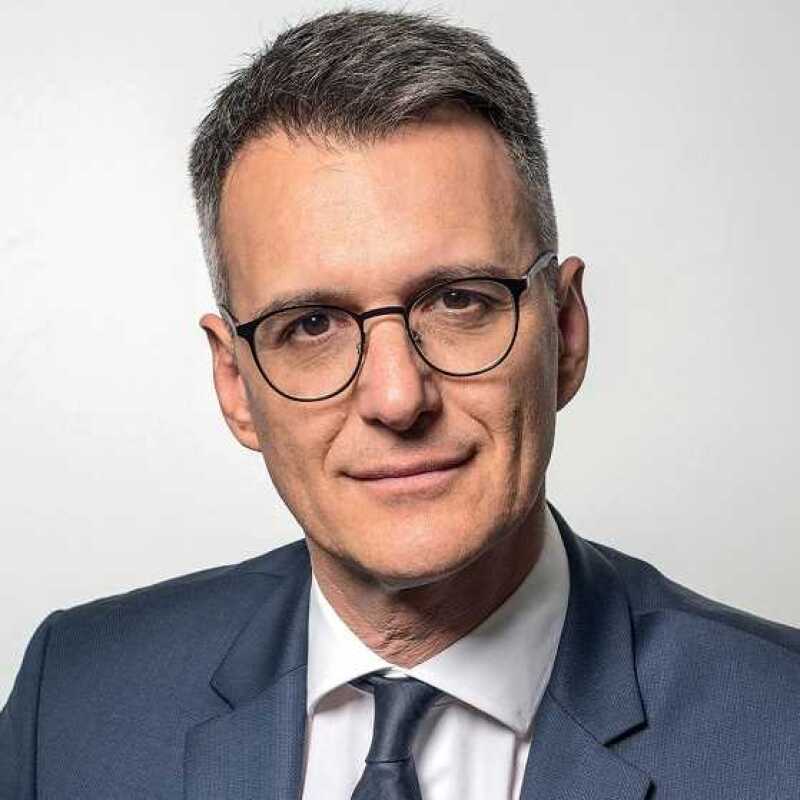
As a major European player that designs, develops and currently operates 21 data centres in France, Italy, Spain and Luxembourg, DATA4 has set its growth strategy based on a sustainable development policy and launched an ambitious DATA4Good programme.
The policy involves all of its stakeholders in a circular economy approach and the DATA4Good action plan has four key themes: Environment, Digital Responsibility, Community and People.
Olivier Micheli, CEO of the DATA4 Group (pictured), said that the company’s “primary responsibility” is its commitment to developing data centre campuses that provide companies and society in general with continuous, secure access to their digital data. “And it’s an immense responsibility because data centres are on the front line for all industries, as well as our digital lives. They’ve become an essential infrastructure component for companies, countries and individuals,” he added.
The Circular Economy
However, Micheli highlights the growing importance of energy consumption and sustainability to the company’s new growth strategy: “At the same time, we have to be able to reconcile the digital transition and the ecological transition. To do so, we’ve decided to invest in the circular economy and work to reduce our ecological footprint throughout the entire life cycle of our data centres.”
In recent years, DATA4 has focused its efforts and made considerable investments to drastically reduce its energy consumption. These efforts have enabled the group to reach a PUE[*] of 1.25 today in its new generation data centres, and to reduce its energy consumption by 20% on a like for like basis.
DATA4 has also experimented with a more general approach taking into account the direct and indirect emissions from its data centres’ activity and its customers’ equipment. This approach, in which the group involves all its stakeholders, is based on the principles of the circular economy.
Life Cycle Analysis Model
To make the circular economy the cornerstone of its sustainable development policy, DATA4 has invested in an approach to identify, sequence and calculate all the direct and indirect emissions from its activities, and those of each of its customers, to establish a resulting action plan targeted on the entire value chain.
Knowledge of the actual environmental footprint of each construction material, each item of equipment and the energy mix relating to a site’s geographical location will enable DATA4 to design its data centres more ecologically and to develop a solid responsible sourcing and waste management policy according to the Reduce/Recycle/Reuse/Recover/Eliminate method.
Furthermore, the Group designs smart data centres that combine an improved user experience with the guarantee of operational excellence and optimised energy consumption and use of its data centres’ resources. With Smart DC, DATA4 offers an innovative and exclusive approach that raises customers’ awareness of the environmental impact of their infrastructure.
This approach also enables it to measure the impacts of a data centre and the customer equipment that is hosted in it based on fundamental notions such as CO2 emissions and the preservation of water, rare earths and ecosystems, and to focus its actions accordingly. This is why, in order to reduce its carbon footprint and show its adherence to the Paris climate agreements by 2030, DATA4 also intends to preserve ecosystems.
“DATA4 has its own forest on its 110-ha campus at Marcoussis in Essonne. This forest, with a surface area of nearly 80 ha, contains many species such as oak, maple and resinous trees, and is home to varied fauna. This space is an enclosed haven of biodiversity that is perfectly maintained via a Simplified Management Plan. DATA4 is proud to manage this forest sustainably to guarantee the permanence of this natural carbon sink by following best practice and all the recommendations made by accredited forestry organisations,” said Jean-Paul Leglaive, QHSE (Quality, Health, Safety and Environment) and Sustainable Development Director.
DATA4Good: Four Key Themes

With the desire to involve all the stakeholders in its circular economy approach and to become the data centre sector leader in terms of sustainable development, DATA4 has defined an action plan with four key themes:
(1) Environment to develop in terms of green energy, eco-design, waste management policy and the preservation of natural resources.
With all the energy consumed by its data centres already 100% offset by renewable energies, the group will focus its investments according to the lessons learnt from its Life Cycle Assessment model. DATA4 will therefore endeavour to reduce the direct and indirect emissions from its activity and that of its customers. The evaluation of environmental performance indicators is based on an official methodology compliant with international Life Cycle Assessment standards, in particular those governed by ISO 14040. It also uses reference databases such as SimaPro and ADEME Impact.
(2) Digital Responsibility to promote responsible digital technology in partnership with the customer and group service provider ecosystem.
DATA4 has created an innovation committee to work with its customer and service provider ecosystem surrounding the challenges of sustainable digital technology. Furthermore, the group is currently testing several solutions to improve the resilience and energy efficiency of its data centres that are based on technologies such as the ‘Digital twin’ which consists in comparing data centres’ actual operation with their theoretical operation.
(3) Community to contribute to the social and environmental challenges of the regions where European campuses are located.
“We’re going to create the first DATA4 Academy on the Marcoussis Campus. Its aims will include teaching about our business lines in a context where digital technology holds a very large reserve of jobs for future years and collaborating with universities and business schools to imagine our future occupations surrounding the environment,” added Jean-Paul Leglaive.
DATA4 is also involved at municipal, departmental and regional level to develop soft mobility methods with the creation of cycle paths in France and Italy, for example.
(4) People to maintain increasingly motivated teams that are committed in the same direction.
DATA4 is deploying a programme to protect its employees’ health and quality of life at work, and to strengthen diversity and team spirit. At the end of 2020, internal satisfaction surveys showed an employee satisfaction rate of 95%.
This work theme is also aimed at training and involving all the group’s employees in the challenges of sustainable development.
DATA4’s commitments within the framework of its DATA4Good programmeDATA4 is committed to sharing and communicating its knowledge of a data centre’s environmental footprint thereby helping assess and quantify the environmental footprint of digital technology, and to actively being part of the national and European agenda for responsible digital technology (Editor’s note: since July 2020, the French Digital Council has made development of knowledge about digital technology’s environmental footprint a central premise). DATA4 is also committed to impact of its actions being measured and shared in total transparency, as the DATA4Good plan was based on the principles for action and standard methodology detailed in ISO 26000. DATA4 has joined the Climate Neutral Datacenter Pact, an initiative launched by European data centre stakeholders, and delivered in partnership with the European Commission, whose aim is to achieve carbon neutrality by 2030. DATA4 also supports Planet Tech Care whose signatories are dedicated to reducing the environmental footprint of digital technology. |
[*] The PUE or power usage effectiveness is an indicator to measure a data center’s energy efficiency. It is calculated by dividing the total energy consumed by the data center by the total energy used by the computer equipment (server, storage and network).





